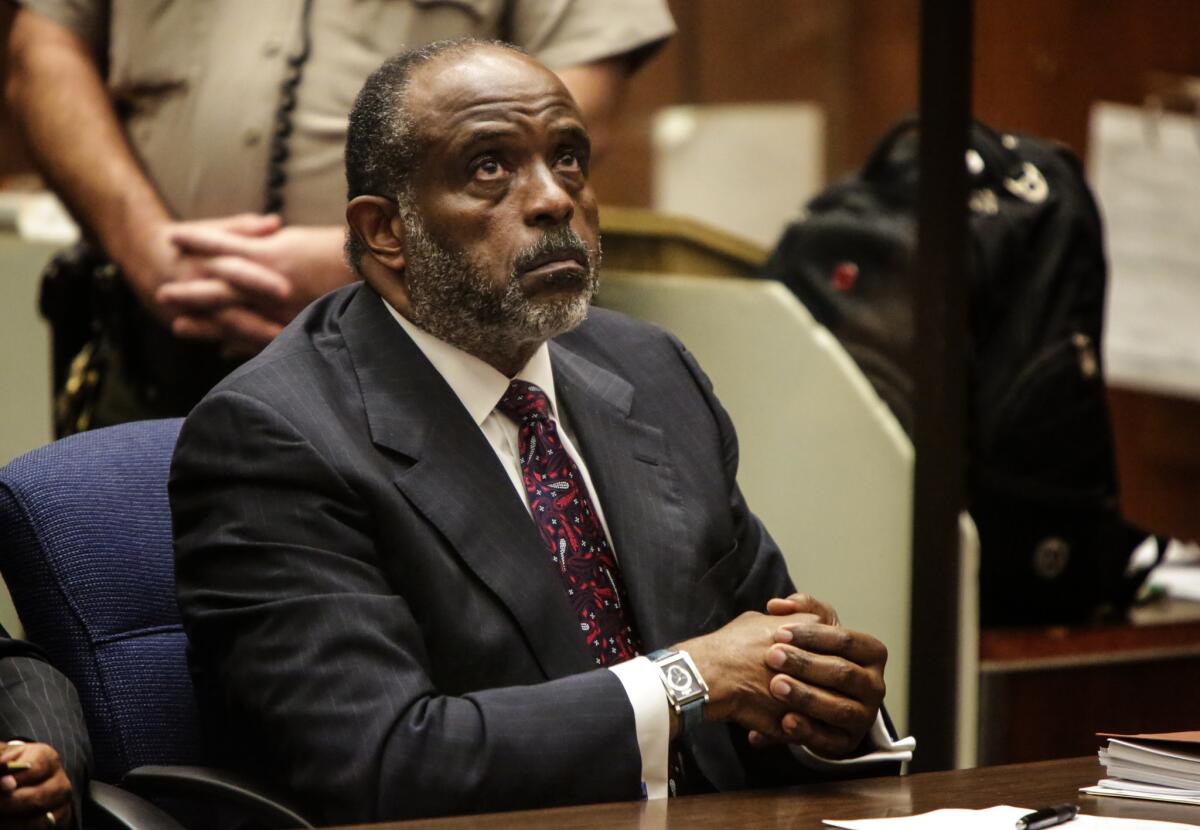California Senate leader calls for Sen. Roderick Wright to resign

- Share via
Reporting from Sacramento — The leader of the California Senate on Friday called for the resignation of Democratic Sen. Roderick Wright after he was sentenced to 90 days in jail for lying about living in his district.
State Senate President Pro Tem Darrell Steinberg (D-Sacramento) called on his colleague to step down after a judge in Los Angeles sentenced Wright on Friday to 90 days in jail, a $2,000 fine, 1,500 hours of community service and a lifetime ban on holding future public office.
“Sen. Wright has a right to appeal as a citizen, but his constituents cannot continue without representation in the state Senate,” Steinberg said in a statement.
“I have stated from the beginning my belief that somebody convicted of a felony while in office cannot continue to serve. I have therefore asked Sen. Wright to resign.”
Steinberg did not say whether he would seek a two-thirds vote to expel Wright if he refused to step down, as he threatened earlier this year.
However, Senate Republican leader Bob Huff of Diamond Bar said Wright would be removed from office if he doesn’t step down.
“Judge Kennedy had more than enough time to weigh the evidence and accept the jury’s verdict,” Huff said in a statement. “Sen. Wright must do the honorable thing and resign immediately. If not, the Senate is prepared to vote to expel him and I am positive there are more than enough votes to do that.”
Steinberg said a review was needed of how residency laws for political candidates were enforced differently in different counties.
Wright represented Inglewood in the Senate but was found to be residing in Baldwin Hills.
“The statewide inconsistency in applying the Elections Code is cause for concern and must be addressed,” Steinberg said.
Wright did not immediately respond to Steinberg’s call for his resignation.
Rhys Williams, a spokesman for Steinberg, said the leader had conveyed his position to Wright in a telephone call. He would not say how Wright responded and said Steinberg had not set a deadline for a response.
Asked if Steinberg was prepared to call for an expulsion vote if Wright doesn’t resign, Williams said, “The senator wants to give Sen. Wright an opportunity to consider his request before discussing actions that may never come to pass.”
Wright was convicted by a jury in January and suspended from the Senate in March.
Steinberg conferred with other Senate leaders before asking Wright to resign.
Even before Steinberg’s announcement, other legislators were pressing for swift action to remove Wright.
Sen. Joel Anderson (R-San Diego) noted that Steinberg warned in February that a convicted felon would not be allowed to continue serving in the Senate, but that he would wait for a judge to first uphold the jury’s verdict and hand down a sentence.
“I believe Sen. Steinberg and the other senators are going to keep their word,” Anderson said, noting that Wright is now a convicted felon.
“We in the Senate are not above the law,” Anderson said.
Sen. Kevin de León (D-Los Angeles), who is slated to take over as Senate leader next month,also spoke with Wright by phone. “Today is a sad day for both my friend and for California,” de Leon said. “I’ve had the opportunity to talk with Senator Wright and I have every hope and expectation that he will do the right thing for his constituents and for the State Senate as an institution.”
If Wright resigns or is expelled, a vacancy in the Senate will trigger a special election to fill his seat before the current term ends in 2016.
In addition, two other senators suspended amid criminal allegations -- Democrats Leland Yee of San Francisco and Ronald S. Calderon of Montebello -- were already prevented by term limits from running for reelection, so their seats will be filled in the Nov. 4 election.
Complicating matters, the Senate adjourned the regular session Aug. 31 and begins the next session with an organizational meeting Dec. 1. It is not clear whether the chamber would reconvene before Dec. 1 to vote on expulsion.
The next session resumes for good on Jan. 5. Once a vacancy is declared, Gov. Jerry Brown will have 14 days to issue a proclamation calling a special election and it must be set at least 126 days but not more than 140 days from the date of his proclamation.
The primary for the special election would be held nine or 10 Tuesdays before the special election runoff.
For more political news in California, follow @mcgreevy99 on Twitter
More to Read
Sign up for Essential California
The most important California stories and recommendations in your inbox every morning.
You may occasionally receive promotional content from the Los Angeles Times.











